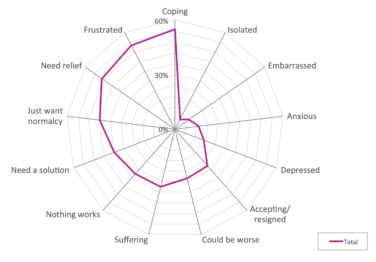While uptake of pharmacogenomics (PGx) is accelerating across virtually all clinical specialties, particular attention is being paid to the value it delivers to elderly patients taking five or more medications (polypharmacy).
Studies report that 98% of patients have genetic variants affecting how well they metabolize specific medications.1 Approximately 80% of variability in drug efficacy and adverse drug reactions (ADR) can be explained by genomic variation.2 Perhaps most significantly, 34% of all potential major ADRs are caused by patient genetics rather than drug-drug interactions.3
The FDA has taken note. Hundreds of medications carry PGx alerts on packaging inserts. Research shows the annual proportion of new drug approvals with PGx labeling has increased by nearly threefold from 10.3% in 2000 to 28.2% in 2020.4
Concerns only compound when providers evaluate how many of their patients—particularly those 65 and older—take multiple medications, any one of which may expose the individual to grave risk.
The Benefits of PGx Testing
Colleagues at two organizations recently conducted an informal analysis of their elderly polypharmacy population to assess potential benefits of PGx testing. At one, a full 29% of the elderly population within the polypharmacy cohort were found to have genetic variations indicating potential PGx risk. At the other, 19% fell into this same category.
Frighteningly, at both facilities, about half of the medications being taken by patients are known to exhibit PGx factors that could trigger drug-gene interactions. Cardiovascular medications (such as blood thinners and statins) were the most likely, followed by frequently prescribed pain, psychiatric, and gastrointestinal medications.
With this data in hand, leaders at the two organizations are undertaking dedicated efforts to educate both providers and patients about the value PGx testing might deliver.
Another colleague, an otolaryngologist on the West Coast, began implementing PGx testing among senior polypharmacy patients late in 2020. He recognized his patients’ drugs had important effects on wellness, including the patients’ ability to exercise, cognition, social interactions, and balance. Noting that precision medicine and PGx are key to his care philosophy, this physician actively works to determine the relationship between medications and genetic profiles.
Awareness of drug-gene interactions has enabled this physician to accomplish more than addressing safety and efficacy concerns. Bringing PGx into his daily workflow has allowed him to make headway in restoring select patients’ health. For example, he notes promising indications that cognition impairment can be stalled or reversed in about a third of his patients.
Without a doubt, healthcare has made great strides to improve medication safety for patients with allergies and drug-drug interactions. The next frontier is early identification of drug-gene factors that may undermine patient well-being and delay or diminish medications’ efficacy.
References:
1. Van Driest, S.L.; Shi, Y.; Bowton, E.A.; Schildcrout, J.S.; Peterson, J.F.; Pulley, J.; Denny, J.C.; Roden, D.M. “Clinically Actionable Genotypes Among 10,000 Patients with Preemptive Pharmacogenomic Testing.” Clin Pharmacol Ther. 2014 Apr;95(4):423-31. doi: 10.1038/clpt.2013.229. Epub 2013 Nov 19.
2. Kim, J.A.; Ceccarelli, R.; Lu, C.Y. “Pharmacogenomic Biomarkers in US FDA-Approved Drug Labels (2000–2020).” J. Pers. Med. 2021, 11, 179. https://doi.org/10.3390/jpm11030179.
3. Verbeurgt, P.; Mamiya, T.; Oesterheld, J. “How Common Are Drug and Gene Interactions? Prevalence in a Sample of 1,143 Patients with CYP2C9, CYP2C19 and CYP2D6 genotyping.” Pharmacogenomics. 2014, 15(5): 655-665.
4. Kim, J.A.; Ceccarelli, R.; Lu, C.Y. “Pharmacogenomic Biomarkers in US FDA-Approved Drug Labels (2000–2020).” J. Pers. Med. 2021, 11, 179. https://doi.org/10.3390/jpm11030179.







